To get the fastest it's probably something hacky.
My guess was:
def iterdir_approach(path):
iter_of_files = (x for x in Path(path).iterdir() if x.isfile())
try:
next(iter_of_files)
next(iter_of_files)
next(iter_of_files)
return True
except:
return False
We create a generator and try to exhaust it, catching the thrown exception if necessary.
To profile the approaches we create a bunch of directories with a bunch of files in them :
import shutil
import tempfile
import timeit
import matplotlib.pyplot as plt
from pathlib import Path
def create_temp_directory(num_directories):
temp_dir = tempfile.mkdtemp()
for i in range(num_directories):
dir_path = os.path.join(temp_dir, f"subdir_{i}")
os.makedirs(dir_path)
for j in range(random.randint(0,i)):
file_path = os.path.join(dir_path, f"file_{j}.txt")
with open(file_path, 'w') as file:
file.write("Sample content")
return temp_dir
We define the various approaches (Copied the other two from the answers to the question:
def iterdir_approach(path):
#@swozny
iter_of_files = (x for x in Path(path).iterdir() if x.isfile())
try:
next(iter_of_files)
next(iter_of_files)
next(iter_of_files)
return True
except:
return False
def len_os_dir_approach(path):
#@bluppfisk
return len(os.listdir(path)) > 2
def check_files_os_scandir_approach(path):
#@PoneyUHC
MINIMUM_SIZE = 3
file_count = 0
for entry in os.scandir(path):
if entry.is_file():
file_count += 1
if file_count == MINIMUM_SIZE:
return True
return False
def path_resolve_approach(path):
#@matleg
directory_path = Path(path).resolve()
nb_files = 0
enough_files = False
for file_path in directory_path.glob("*"):
if file_path.is_file():
nb_files += 1
if nb_files > 2:
return True
return False
def dilettant_approach(path):
#@dilettant
gen = os.scandir(path) # OP states only files in folder /path/
enough = 3 # At least 2 files
has_enough = len(list(itertools.islice(gen, enough))) >= enough
return has_enough
def adrian_ang_approach(path):
#@adrian_ang
count = 0
with os.scandir(path) as entries:
for entry in entries:
if entry.is_file():
count += 1
if count > 2:
return True
return False
Then we profile the code using timeit.timeit and plot the execution times for various amounts of directories:
num_directories_list = [10, 50, 100, 200, 500,1000]
approach1_times = []
approach2_times = []
approach3_times = []
approach4_times = []
approach5_times = []
approach6_times = []
for num_directories in num_directories_list:
temp_dir = create_temp_directory(num_directories)
subdir_paths = [str(p) for p in Path(create_temp_directory(num_directories)).iterdir()]
approach1_time = timeit.timeit(lambda: [iterdir_approach(path)for path in subdir_paths], number=5)
approach2_time = timeit.timeit(lambda: [check_files_os_scandir_approach(path)for path in subdir_paths], number=5)
approach3_time = timeit.timeit(lambda: [path_resolve_approach(path)for path in subdir_paths], number=5)
approach4_time = timeit.timeit(lambda: [len_os_dir_approach(path)for path in subdir_paths], number=5)
approach5_time = timeit.timeit(lambda: [dilettant_approach(path)for path in subdir_paths], number=5)
approach6_time = timeit.timeit(lambda: [adrian_ang_approach(path)for path in subdir_paths], number=5)
approach1_times.append(approach1_time)
approach2_times.append(approach2_time)
approach3_times.append(approach3_time)
approach4_times.append(approach4_time)
approach5_times.append(approach5_time)
approach6_times.append(approach6_time)
shutil.rmtree(temp_dir)
Visualization of the results
plt.plot(num_directories_list, approach1_times, label='iterdir_approach')
plt.plot(num_directories_list, approach2_times, label='check_files_os_scandir_approach')
plt.plot(num_directories_list, approach3_times, label='path_resolve_approach')
plt.plot(num_directories_list, approach4_times, label='os_dir_approach')
plt.plot(num_directories_list, approach5_times, label='dilettant_approach')
plt.plot(num_directories_list, approach6_times, label='adrian_ang_approach')
plt.xlabel('Number of Directories')
plt.ylabel('Execution Time (seconds)')
plt.title('Performance Comparison')
plt.legend()
plt.show()

Closeup of best 3 solutions:




